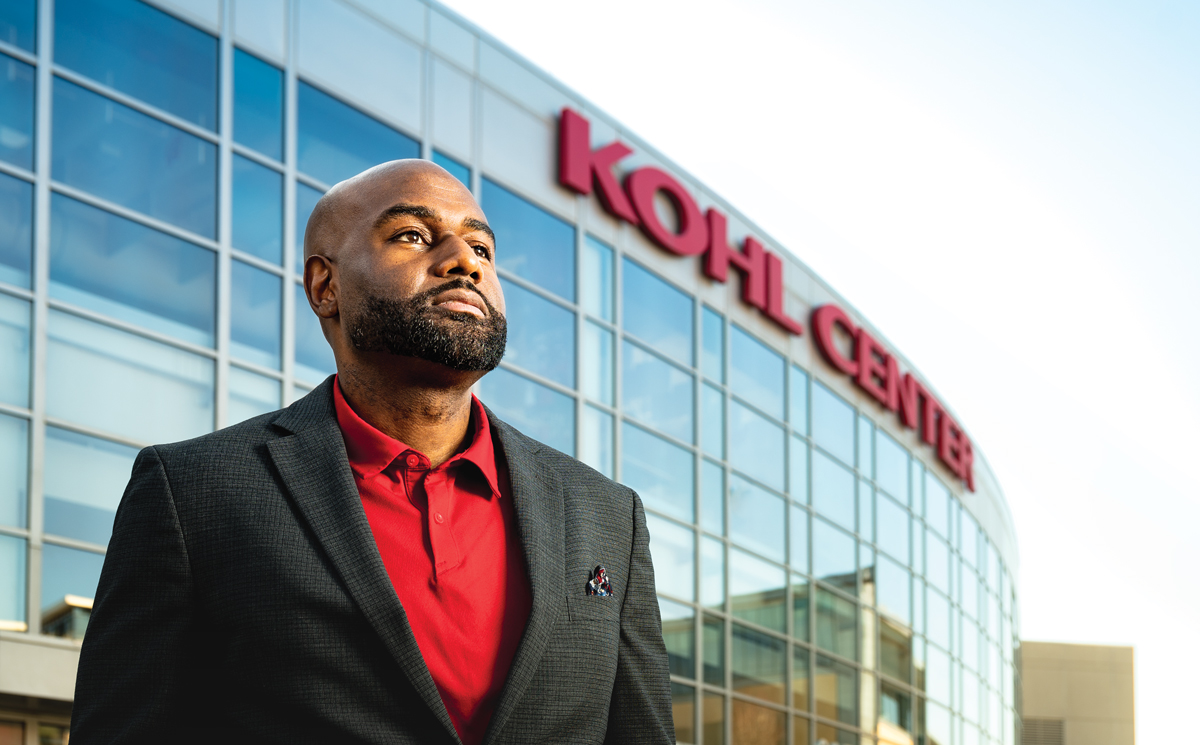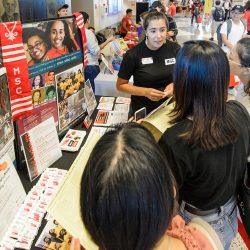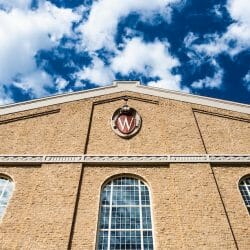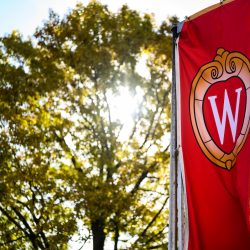An Inclusive New Era for UW Athletics
Mike Jackson ’04, MBA’13 oversees the department’s diversity efforts during a transformative time.
For Mike Jackson ’04, MBA’13, the work is personal. Over three stints on campus, the UW’s new associate athletic director of development, inclusion, and engagement has heard the same commitments and seen the same shortcomings related to diversity. And he wants to break that cycle.
It’s why Jackson returned to the UW in January 2020, leaving his job in Houston, Texas, as chief development and marketing officer at Northwestern Mutual — a Fortune 100 company. “I was motivated by purpose and passion,” he says. A former two-sport student-athlete, he’s now overseeing all of the athletics department’s fundraising and diversity efforts during a transformative time.
It’s been “a transition for the ages,” Jackson admits. Just months after he arrived on campus, the pandemic hit and the police killings of George Floyd and Breonna Taylor prompted national outrage.
“For those in the Black community, this is not new,” Jackson says. “I’ve experienced police brutality. I’ve seen that it’s not necessarily about you doing the right thing. I’ve seen that it’s not necessarily about you being educated. I’ve seen that it’s not necessarily about you being a recognizable sports figure. … So this moment was more of a reminder. And it elicits the same anger. It elicits the same frustration. It elicits the same sense of hope [for change].”
The campus community mobilized in response, and former UW student-athletes wrote open letters calling on the athletics department to be part of the solution in ending systemic racism. In response, Athletic Director Barry Alvarez highlighted the department’s existing plans but acknowledged that they will need to be turned into measurable actions.
In 2016, UW athletics became one of the first NCAA programs to establish a director of diversity and inclusion, and there’s now a team dedicated to those efforts. The Diversity, Equity & Inclusion Strategic Plan, released in September and outlining some 30 initiatives, was years in the making.
The efforts include the creation of campus and community partnerships to better involve student-athletes, a hate and bias reporting procedure, a staff mentorship program, and a job-shadow and pipeline initiative. The department has been developing a series of diversity and equity trainings for players, coaches, and staff. It’s also established an Equity Diversity Council, which serves in a consulting capacity, and Badger Affinity Groups, which connect student-athletes of similar backgrounds and identities. These initiatives and others will be financially supported by the Raimey-Noland campaign, a new endowment fund for UW–Madison.
“We have to enhance the experiences of our student-athletes — in particular those who are underrepresented on campus,” Jackson says. He knows why it’s important.
Jackson earned track-and-field and Boys & Girls Club scholarships to the UW. He later walked on to the 2001 basketball team, which won the Big Ten championship in Bo Ryan’s first year as head coach. In the classroom, he rarely saw anyone who looked like him. In competition, his teams won multiple championships, but Jackson found less success individually, and a serious injury abruptly ended his playing career.
“Because I had such good relationships with our academics team and our coaching staff, I was able to have a great journey,” he says. “But I saw many others who didn’t necessarily have that opportunity.”
When Jackson returned to campus in 2010 to pursue his MBA, he noticed a new divide between student-athletes and the rest of the student body. “When I was here as a student-athlete, we found great refuge in the Red Gym [with its student services]. There was a lot more synergy across campus,” he says. “I was shocked to see that had changed.”
For that reason, he was particularly proud when a group of student-athletes approached the athletics department over the summer and asked to add a patch to team jerseys. They modified the UW’s academic logo, with the white W in the crest shaded to black, to symbolize their solidarity with underrepresented students across campus.
Grounded in business, Jackson will rely on metrics to hold the department — and university — accountable to its promises. “But ultimately,” he says, “success will be seeing student-athletes walk out of here speaking highly of their experiences across all areas.”
Published in the Spring 2021 issue




Comments
No comments posted yet.